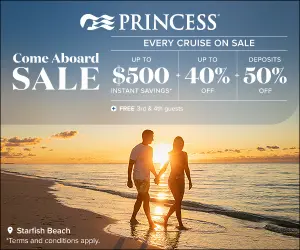Why Do Cruise Lines Do the Things They Do?
by Fran GoldenThis is the first of two parts.
You know those crazy up and down cruise fares that drive your commissions to sub-basement levels? That’s not cruise line whimsy at work. It’s the result of so-called dynamic pricing, driven by a cruise line business model with high fixed costs.
From the cruise line perspective, high-fixed costs make cruise “a perilous business to make money in,” according to industry veteran Rod McLeod, CTC. Those costs also explain cruise line willingness to sell a berth for next to nothing, rather than let it go empty – as well as cruise lines’ heightened focus on driving shipboard revenues.
 |
For agents, concerned with their own bottom lines, the economics that drive these and other cruise line decisions – including ship deployment and agent relations – can be a puzzle.
Travel Market Report turned to McLeod for an overview of cruise line economics and the impact on agents. McLeod is a former top executive at Royal Caribbean, Norwegian Cruise Line and Carnival Corp. Currently, he advises travel suppliers, tourism authorities and marketing communications companies as co-founding partner of McLeod, Applebaum & Partners in south Florida.
In Part One, McLeod focuses on the business fundamentals of cruise lines – including costs, revenues and pricing. Part Two will look at cruise line relations with agents and why cruise lines move ships around so much.
Editor’s note: The interview with McLeod was conducted prior to Costa Concordia’s Jan. 13 grounding off the coast of Italy. Reporter Fran Golden got back to McLeod after that event to hear his views of the tragedy’s impact on the industry. Please see sidebar for his answers.
(The following responses have been edited.)
How exactly do cruise lines make their money?
McLeod: Let’s first look at the market. Since I came into the business in 1969 to two years ago, there were 90 cruise lines that marketed to North Americans that to some level have gone out of business – lines like Monarch and American Hawaii.
It’s a perilous business to make money in – a high fixed-cost business. It costs a lot to build a cruise ship – in the range of $500,000 per cabin, $250,000 a berth. So your break-even levels are well up there.
Most ships have a 25-year lifespan. But you’ll be hard-pressed to find a ship marketed to North Americans built before 1990. The useful life in the mainstream North American cruise market is more like 15 to 20 years, and then they ugly-out, in the North American market – they aren’t as fast, as big or as beautiful. That’s why you now have Sovereign of the Seas sailing for Pullman Tours in Spain.
So you have the cost of the ship itself, then what?
McLeod: Let’s say you’re talking about the Eastern Caribbean, where you are doing some version of Nassau, St. Thomas, St. Maarten. The fuel cost is the same no matter how many passengers. You have the same crew onboard and entertainment. If the ship is not full you will save on food costs but not much as you have stocked based on 100% occupancy.
There is not much wiggle room. So the way you make money is you optimize your revenues, which is one reason you see ‘dynamic’ pricing.
‘Dynamic’ pricing – meaning crazy, unpredictable fares?
McLeod: Back in the old days, in the print brochure, cruise lines would have a minimum price and use that as a ‘guarantee.’ That was it, except for group discounts and added value incentives (i.e. free or reduced airfare, onboard credits, etc.).
Today pricing is based on current demand flow and sailing-by-sailing demand forecasts; you may get one price today, and a week later, or even tomorrow, a higher price, or maybe lower. And the pricing by category — interior, ocean-view, balconied, triples, quads — may also move independently.
Also, occupancy levels can be misleading: while they are routinely more than 100%, this doesn’t mean every cabin is full, just that cruise lines are working with a double occupancy denominator.
How does onboard revenue come into play?
McLeod: About 70% of revenue comes from tickets and the other 30% from onboard – shore excursions, casinos, booze, gift shops, spas, photo, as well as travel insurance (sold through the line), pre- and post-hotels, transfers and other services.
Onboard, the big revenue producers are liquor, casino, gift shops then shore excursions. The equation changes in different markets – for instance casinos don’t do well in Europe; shore excursions are not as popular in the Caribbean.
Onboard revenue is disproportionately higher in terms of the net profit, which is why the cruise lines push to fill every berth and go to heroic extremes at times to get people onboard.
It’s important to understand that people seem to have two wallets, one for cruise tickets and one for onboard spending, and they tend to be fairly consistent about what they will spend onboard.
So get them on for cheap?
McLeod: From a cruise line perspective, it’s better to get $499 for a one-week cruise than zero. You have the passenger paying gratuities to the staff, and you can make a profit on booze, etc.
Inside the major cruise lines, you will find they are spending a lot of time managing pricing to optimize revenues. Like agents, they want a higher-priced ticket.
They use algorithms similar to those in politics for forecasting what the likely result will be if they if they raise pricing a bit. It’s game theory and some pretty smart people are doing that at cruise lines today.
Why are we seeing a proliferation of charges for things like alternative dining?
McLeod: The cruise lines are looking at ways to improve profit and product without cost (to them).
Twenty years ago, meals were included; you had main or second seating, maybe a Lido café for breakfast and lunch, and the cruise routine was like a clock in motion. As a passenger maybe you had a before-dinner drink, a little dancing, then after dinner you went to another lounge for a show, and, if you still had stamina, to the nightclub for a night cap.
Today, people want more options. So the industry created bigger ships to have room to do more things, and that means higher costs and more crew. But it turns out some things people are willing to pay for. So there are, for instance, an array of restaurants and they are normally quite full.
So as the passenger you can have any experience you are willing to pay for?
McLeod: Yes, within the bounds of reason. You can have very different experiences on the same cruise and at different cost. The silver fox empty nesters may want to eat in every dining room and sample the wines, whereas the family can do the kids’ center, the pizza parties. And you can stay in very different accommodations too.
Do the extras change the concept of segmentation – mainstream, premium, luxury?
McLeod: Segmentation was created for analysts and is almost useless from a consumer standpoint. You can have a luxury experience onboard the largest cruise ships in the world, from what you pay and the size of your suite to your dining experience.
What’s happening on ships is similar to what’s happening in Vegas, where you can now find brands like Ritz-Carlton, but you can still hit the $9.95 buffet. There are more choices.
Next time: The future of travel agency distribution for cruise – plus, a look at why cruise lines move ships around so much.






















